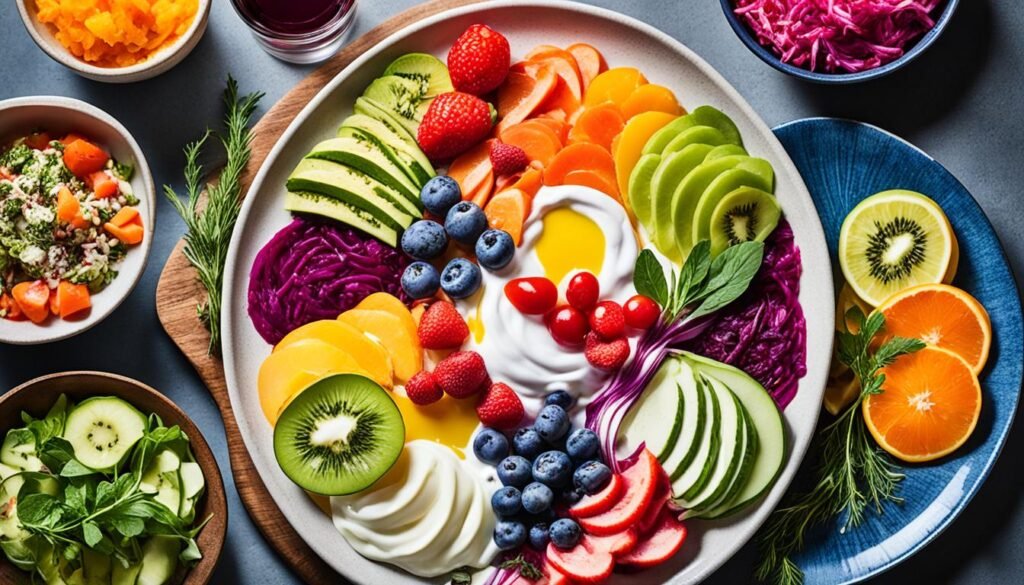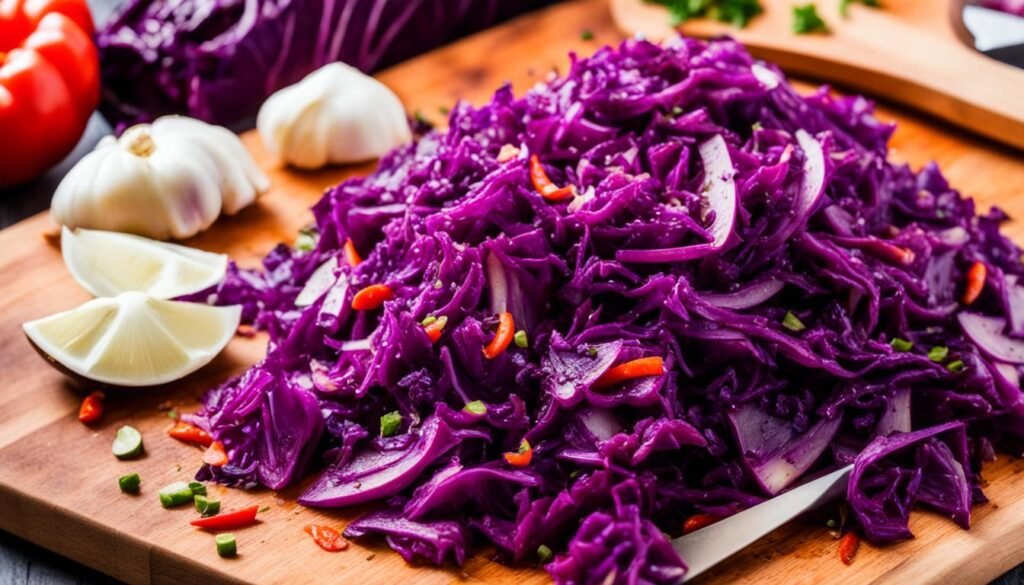I’ve always been interested in how the gut microbiome affects our health. That’s why I’m excited to share 6 tasty, probiotic-rich recipes. These recipes are great for your gut and also taste amazing.
We’ll talk about why a healthy gut microbiome is important. We’ll also look at the benefits of probiotics and fermented foods. Let’s start this journey to better health together.
Key Takeaways
- Explore 6 probiotic-rich recipes to support digestive health
- Understand the significance of the gut microbiome and its impact on overall wellness
- Discover the power of probiotics and their role in maintaining a balanced gut flora
- Learn about the benefits of incorporating fermented foods, such as yogurt, kefir, sauerkraut, and miso, into your diet
- Gain insights into creating a gut-friendly daily routine
Understanding the Gut Microbiome
Our digestive system is filled with a complex ecosystem – the Gut Microbiome. It’s home to trillions of microorganisms like bacteria, fungi, and viruses. These tiny creatures are key to our health and well-being. Having the right mix of good and bad gut bacteria, known as gut flora, is crucial. It helps with digestion, absorbing nutrients, and keeping our immune system strong.
The Importance of a Balanced Gut Flora
A balanced gut microbiome supports many body functions, like:
- Efficient digestion and nutrient absorption
- Strengthening the immune system
- Regulating inflammation and inflammatory responses
- Improving mental health and cognitive function
- Maintaining a healthy weight and metabolism
Factors That Disrupt Gut Health
Modern life and our environment can throw off the balance in our gut microbiome. This can lead to health problems. Some common disruptors include:
- Poor dietary choices, like eating too much processed food and not enough fiber
- Too many antibiotics, which can harm both good and bad bacteria
- High stress levels, which can change the gut-brain connection
- Not moving enough and a sedentary lifestyle
- Being exposed to toxins and pollutants
Learning about the gut microbiome and how to keep gut flora balanced helps us support our health and wellness.
The Power of Probiotics
Probiotics are the “good” bacteria that help balance our gut microbiome. Eating foods rich in probiotics or taking supplements can boost our health. They aid digestion, strengthen our immune system, and even help our mental health.
Our gut microbiome is full of trillions of microorganisms. When this balance is off, we might face health problems, like digestive issues or chronic inflammation. Probiotics are key in fixing this by adding good bacteria to our gut.
Research shows probiotics help break down nutrients and absorb them better. They also lower the chance of infections and can ease symptoms of IBS and IBD. Plus, they might improve our mental health by linking the gut and brain.
| Probiotic Benefits | Impact on Gut Health |
|---|---|
| Improved digestion | Restores balance in the gut microbiome |
| Strengthened immune system | Reduces inflammation and risk of infections |
| Enhanced mental well-being | Supports the gut-brain axis |
Adding probiotics to your diet is easy and effective for better health. You can find them in foods like yogurt, kefir, and sauerkraut or in supplements. These good bacteria can make your digestive system work better and show the power of probiotics.
Fermented Foods: Nature’s Probiotic Powerhouses
Foods like yogurt, kefir, sauerkraut, and kimchi are great for gut health. They change in a way that brings lots of good bacteria, enzymes, and nutrients. These foods help feed the gut and keep us healthy. By eating fermented foods, we get lots of probiotics and help our gut health thrive.
The Benefits of Fermented Foods
Fermented foods are full of probiotics. These are live microorganisms that help fix the balance in our gut. Eating these foods can bring many benefits:
- Improved digestion and nutrient absorption
- Enhanced immune function
- Reduced inflammation and better gut barrier function
- Potential support for weight management and metabolic health
- Improved mental well-being and cognitive function
The way these foods are made also makes them taste great. Adding different fermented foods to your meals is an easy way to boost your gut health and enjoy the benefits of probiotics.
“Fermented foods are the ultimate gut-friendly superfoods, packed with beneficial bacteria that can work wonders for your digestive health and overall well-being.”
Gut-Friendly Meal Plan: 6 Probiotic-Rich Recipes for Digestive Health
Keeping your gut healthy is key for feeling good overall. Eating foods full of probiotics is a great way to help your gut. I’ll share six tasty recipes that are full of probiotics and easy to add to your daily meals.
These recipes include foods like yogurt, kefir, and sauerkraut, which are great for your gut. Adding these foods to your meals can help keep your gut flora balanced. This supports your digestive health.
Creamy Probiotic-Packed Smoothie
Begin your day with a smoothie that’s both refreshing and good for your gut. Mix plain yogurt, kefir, fresh berries, and a bit of honey for a creamy treat full of probiotics.
Roasted Vegetable and Sauerkraut Salad
Combine roasted veggies like Brussels sprouts, carrots, and red onions with tangy sauerkraut and a simple dressing. This makes a tasty salad that’s also good for your gut.
Miso-Glazed Salmon with Pickled Ginger
Soak salmon fillets in a miso sauce, then bake them. Serve with pickled ginger on the side for a meal that’s both delicious and good for your gut.
| Recipe | Probiotic-Rich Ingredients | Health Benefits |
|---|---|---|
| Overnight Oats with Kefir and Berries | Kefir, Berries | Supports a healthy gut and immune system, provides fiber and antioxidants. |
| Kimchi Fried Rice | Kimchi | Boosts gut health, provides vitamins and minerals, and adds a flavorful punch to the dish. |
| Miso Soup with Tofu and Wakame | Miso, Wakame | Promotes a healthy gut, provides umami flavor, and is a good source of protein and minerals. |
Adding these probiotic-rich recipes to your meals is a big step towards a healthier gut and better digestion. Enjoy these tasty dishes as part of a balanced diet.

Yogurt: A Classic Probiotic Powerhouse
Yogurt is a versatile, gut-friendly food that has been a staple in many cultures for centuries. It’s a natural source of probiotics, which can help support a healthy gut microbiome. Here, I’ll share a simple recipe for making delicious, homemade yogurt. You can enjoy it on its own or add it to your favorite dishes.
Homemade Yogurt Recipe
Making your own yogurt at home is easier than you might think. Here’s a step-by-step guide to creating a creamy, probiotic-rich yogurt that will nourish your gut health:
- Gather your ingredients: 4 cups of whole milk (or plant-based milk of your choice), 2 tablespoons of plain yogurt with active probiotics.
- Heat the milk in a saucepan over medium heat, stirring occasionally, until it reaches 180°F (82°C).
- Remove the milk from the heat and let it cool to 110°F (43°C).
- In a clean, glass container, mix the cooled milk with the 2 tablespoons of plain yogurt.
- Cover the container and let the mixture incubate at a warm temperature (between 100-110°F/38-43°C) for 8-12 hours, or until the yogurt has thickened to your desired consistency.
- Once the yogurt has reached the desired thickness, refrigerate it for at least 4 hours before enjoying.
This simple homemade yogurt recipe lets you control the ingredients. You can ensure you’re getting a high-quality, probiotic-rich yogurt for your gut health. Enjoy it on its own, with fresh fruit, or use it in dips, smoothies, and more.
Kefir: A Tangy and Nutritious Probiotic Drink
If you want to improve your gut health, Kefir is a great choice. This fermented dairy drink is full of probiotics that are good for your gut health. It tastes tangy and feels creamy, making it perfect for drinking alone or adding to recipes.
Kefir is made by fermenting milk with kefir grains. These grains are a mix of bacteria and yeast. This process creates lots of probiotics and important nutrients like calcium, protein, and vitamin B12. Drinking kefir often can help keep your gut microbiome healthy, improve digestion, and boost your immune system.
- High in probiotics that support gut health
- Excellent source of calcium, protein, and vitamin B12
- Tangy, creamy flavor that’s refreshing and versatile
You can enjoy kefir by itself or add it to smoothies, salad dressings, or baked goods. This probiotic drink is a great way to feed your body well from the inside. Try adding kefir to your meals and feel the good effects on your gut health!
Kefir is a powerful probiotic drink that can do wonders for your gut health.
Sauerkraut: A Flavorful Probiotic Superfood
Sauerkraut is a fermented cabbage dish that’s packed with nutrients and probiotics. It’s a simple food that boosts digestion and supports your health. This dish is both tasty and good for you.
Easy Homemade Sauerkraut Recipe
Creating your own Sauerkraut is easy and lets you pick the ingredients. Here’s a simple recipe to start with:
- Finely shred or chop 1 medium head of green cabbage.
- Put the shredded cabbage in a big bowl and add 1-2 tablespoons of sea salt. Rub the salt into the cabbage until it starts to release juices.
- Put the salted cabbage into a clean, sterilized glass jar, pressing it down to remove air pockets.
- Use a smaller jar or a clean rock to keep the cabbage under the brine.
- Put a cloth or coffee filter over the jar and tie it with a rubber band.
- Let the Sauerkraut ferment at room temperature for 4-6 weeks. Check it often and remove any scum that forms.
- When the Sauerkraut tastes right, move it to the fridge to slow down fermentation.
Enjoy your homemade Sauerkraut as a tasty side, on sandwiches, or in other dishes. It adds a boost of probiotics and gut health to your meals.
“Sauerkraut is a true probiotic powerhouse, offering a wealth of gut-supporting benefits with every bite.”
Kimchi: A Spicy Korean Probiotic Delight
Explore the world of Kimchi, a fermented vegetable dish full of probiotics and flavor. It’s a traditional Korean food that supports a healthy gut and overall health.
Kimchi is made by fermenting vegetables like napa cabbage, radish, and scallions with seasonings like garlic, ginger, and Korean chili pepper. This process boosts the flavor and creates a source of probiotics. These probiotics help keep your gut microbiome balanced.
Kimchi is very versatile. You can enjoy it as a side dish or add it to many recipes. It brings a spicy kick and supports your gut health when you eat it.
The Probiotic Powerhouse of Kimchi
Foods like kimchi are full of probiotics because they’re fermented. Beneficial bacteria grow during this process, making your gut flora diverse and strong. These probiotics are key for a healthy digestive system, better nutrient absorption, and a strong immune system.
- Kimchi is packed with Lactobacillus plantarum, a probiotic that helps your gut barrier and reduces inflammation.
- The fermentation makes lactic acid, which stops harmful bacteria and yeasts in the gut.
- Eating kimchi often can balance your gut microbiome. This leads to better digestion, nutrient absorption, and overall health.
Kimchi is a tasty and gut-friendly food. Make it a key part of your probiotic-rich diet. Enjoy the spicy Korean delight and take care of your body.

Miso: A Japanese Probiotic Umami Bomb
In the world of gut-friendly superfoods, miso is a top choice. This fermented soybean paste is full of probiotics and has a strong umami taste. It can make any dish better. I’m excited to share a simple and tasty miso soup recipe. It will make your taste buds happy and your gut healthy.
Miso Soup Recipe
Miso soup is a classic in Japanese food that’s easy to make at home. Here’s how to make a gut-friendly miso soup that’s both warming and full of probiotics:
- Start by bringing 4 cups of water to a gentle simmer in a medium-sized pot.
- Add 1/4 cup of thinly sliced shiitake mushrooms, 1/2 cup of cubed firm tofu, and 2 tablespoons of mirin (Japanese cooking wine).
- Reduce the heat to low and whisk in 2 tablespoons of miso paste until it’s fully dissolved.
- Stir in 2 cups of baby spinach or chopped bok choy, and let the soup simmer for 5 minutes, just until the greens are wilted.
- Ladle the miso soup into your favorite bowls and enjoy its comforting, umami-rich flavor.
This miso soup recipe is simple yet packed with gut-health benefits from miso. Adding this fermented ingredient treats your taste buds and feeds your gut health with probiotics.
“Miso is a true probiotic superstar, providing a rich and complex umami flavor that can transform any dish into a gut-friendly masterpiece.”
Next time you want a comforting, nutritious meal, try making this miso soup. Let the probiotic magic improve your digestive system. Bon appétit!
Kombucha: A Fizzy Probiotic Beverage
Kombucha is a fermented tea that has become very popular. It’s fizzy, tasty, and full of probiotics and other good stuff for your gut health.
The way it’s made creates a lot of probiotics. These are live microorganisms that help keep your gut balanced. Drinking kombucha can feed your digestive system and boost your health.
Kombucha is also very versatile. You can mix it with fruit juices, herbs, and spices to make different flavors. This lets you find a taste you like, whether you want something sour or sweet.
Adding kombucha to your daily routine is easy and fun. It’s full of probiotics and tastes great. It’s a great choice for anyone who cares about their health.
“Kombucha is a delightful way to nourish your gut and support your overall well-being.”
Incorporating Probiotics into Your Daily Routine
Keeping a healthy gut microbiome is key to our health. Adding foods and drinks high in probiotics to our daily meals helps our digestive health. By eating fermented foods and drinks, we feed the good bacteria in our gut. This keeps our gut microbiome balanced.
Starting your day with yogurt or kefir is a great way to get more probiotics. These foods are full of live cultures that help our gut bacteria. For a quick, healthy breakfast, add fresh berries and granola to your yogurt.
To increase your probiotic intake, try sauerkraut, kimchi, or miso in your meals. These foods are full of probiotics and add flavor to your dishes. Add sauerkraut to your sandwich or mix miso into your soup for a gut-friendly boost.
Enjoying a glass of kombucha is another way to support your gut health. This fermented tea is fizzy and full of probiotics. It’s a great choice instead of sugary drinks. Try different flavors and brands to find your favorite.
A diverse Gut Microbiome is key for good health. Adding Probiotics to your daily routine helps your digestive system and supports your body’s natural defenses.
| Probiotic-Rich Food | Benefits |
|---|---|
| Yogurt | Replenishes good bacteria, supports digestion |
| Kefir | Tangy, nutritious, rich in probiotics |
| Sauerkraut | Flavorful, probiotic-packed fermented cabbage |
| Kimchi | Spicy Korean dish with gut-friendly probiotics |
| Miso | Japanese probiotic paste with umami flavor |
| Kombucha | Fizzy, fermented tea that’s a probiotic delight |
Conclusion
As we wrap up our exploration of gut health and probiotics, I hope you’re ready to support your digestive health. Adding fermented foods like yogurt, kefir, sauerkraut, kimchi, miso, and kombucha to your diet can boost your gut microbiome. This can lead to better health overall.
A healthy gut is key for good digestion, a strong immune system, and even mental health. By making a few dietary changes and trying the 6 probiotic-rich recipes here, you can improve your gut health. This can lead to a healthier you.
Choosing to focus on Gut Health, Probiotics, and Fermented Foods is a big step towards being healthier and more balanced. So, let’s celebrate your digestive health and the amazing benefits of a healthy gut microbiome. Cheers to your journey towards better Gut Health!



